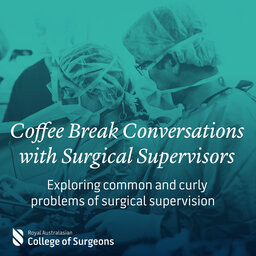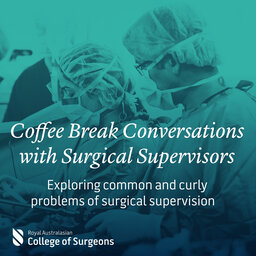Health Advocacy - Part 2
This episode on is the second of a two-part episode on Health Advocacy.
Part 1, with Dr Neill Boustred, focussed on Health Advocacy of the Surgeon – assessing and teaching trainee and Specialist International Medical Graduate (SIMG) surgeons to advocate for the benefit of the recipients of healthcare.
In this second part, Health Advocacy for the Surgeon – the focus is on assessing and teaching trainees and SIMGs to advocate for the wellbeing of the surgical workforce.
Episode guest – Dr Ruth Bollard:
Dr Ruth Bollard is a General Surgeon who has been operating and consulting in Ballarat for over 15 years. Ballarat is a regional Australian setting and is where she provides important surgical services.
Dr Bollard has a clinical interest and expertise in breast cancer and reconstructive surgery. She has more than 20 years of experience in the field of Oncoplastic breast surgery and more than 30 years of experience in general surgery.
Dr Bollard has been an elected councillor of the Royal Australasian College of Surgeons (RACS) since 2016 and has made significant contributions to surgical education and training through numerous roles, committees and working groups.
She currently holds the positions of:
- Executive member, RACS Education Committee
- Chair, RACS Specialist International Medical Graduate Committee
Dr Bollard has demonstrated a keen interest in the topic of Health Advocacy as evidenced by her leadership in wellbeing initiatives at RACS including being the:
- Current RACS representative on Black Dog Institute Health Professionals Advisory Group
- Chair of Intercollegiate Wellbeing working party, (2019 – 2023)
This working party collaborated with medical colleges across Australia and New Zealand to produce the Wellbeing Charter for Doctors
Wellbeing Charter for Doctors in Australia and New Zealand (2021)
- Chair of Safe Working Hours Committee RACS, (2018 – 2019)
This committee consulted to develop and publish standards for safe working hours and conditions for surgeons.
RACS Position Paper Standards for Safe Working Hours and Conditions (2019)
Key points in this conversation on Health Advocacy:
- Promoting and creating an optimal environment for the wellbeing of recipients of healthcare and the providers of healthcare in a sustainable and responsible way is very challenging. There are many competing factors to consider. What is important, is to consider as many factors as possible for the unique circumstances of individuals and try to make choices that support the wellbeing of all concerned.
- The wellbeing of our surgeons, trainees and SIMGs and other healthcare providers is critical to providing safe, accessible, sustainable, person-centred healthcare. We need to continue to find ways to adapt to the needs of our doctors so they can continue to provide safe care.
Work needs to continue in line with that already undertaken with such initiatives as those in the RACS Position Paper Standards for Safe Working Hours and Conditions (2019) and the Wellbeing Charter for Doctors in Australia and New Zealand (2021)
- Teaching and assessing Health Advocacy can be approached using many different strategies including:
- Being a role model - overtly demonstrating and intentionally drawing attention to attitudes and behaviours that promote and support:
- the wellbeing of users of healthcare and those who provide the care.
- sustainability measures including financial, environmental and workforce.
- Setting activities that require a trainee or SIMG to apply principles of health advocacy. An example of this is writing a business case for additional resources.
- Leading activities that require evaluation of performance in the area of health advocacy, encourage reflection, and support feedback. e.g. the 360-degree feedback process.
- Including questions on health advocacy in assessment activities when assessing other areas of competence. E.g exam questions, MiniCEX, case-based assessments, MDT meetings, case presentations and in direct observation of practice.
To provide feedback, suggest topics for discussion, share ideas or offer to be a guest, please complete the feedback survey via the following link https://forms.office.com/r/xP3uWrGQ6K or email Catherine Hunt Medical Educator RACS Catherine.Hunt@surgeons.org
RACS Resources to Support Surgical Supervisors
Supervisor Support Hub | RACS (surgeons.org)
The Supervisor Framework | RACS (surgeons.org)
In 1 playlist(s)
Coffee Break Conversations with Surgical Supervisors
Surgeons’ roles are diverse, with many demands placed on their time and attention. Supervising Train…Social links
Follow podcast
Recent clips

Judgement and clinical decision making with Dr Rebecca Garland
33:47

Health Advocacy - Part1
32:35

What makes a great surgical supervisor?
32:09
 Coffee Break Conversations with Surgical Supervisors
Coffee Break Conversations with Surgical Supervisors